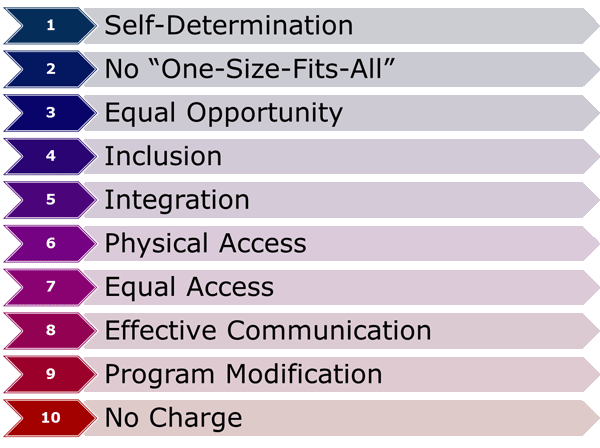Public Resources
Public Resources
Legal foundation
Although there is no one law that dictates the provision of functional needs support services, those involved in emergency management and shelter planning must be familiar with the concepts of accessibility and non-discrimination while preparing for, responding to, and recovering from an emergency. We should be prepared to meet everyone's needs. There is also legal precedent which requires integration and inclusion in all community services.
1. FEMA's Non-Discrimination Principles of the Law
The Stafford Act and Post-Katrina Emergency Management Reform Act (PKEMRA), along with Federal civil rights laws, mandate integration and equal opportunity for people with disabilities in general population shelters. In addition, failing to integrate general population shelters is a violation of federal law, including the ADA, Rehabilitation Act, and the Fair Housing Act.
To comply with Federal law, those involved in emergency management and shelter planning should understand the concepts of accessibility and nondiscrimination and how they apply in emergencies. The following are key nondiscrimination concepts applicable under Federal laws, and examples of how these concepts apply to all phases of emergency management (FEMA, 2010).2![]()
 Guidance on Planning for Integration of Functional Needs Support Services in General Population Shelters. |
2. Federal and State Legislation and Regulations
To comply with Federal law, those involved in emergency management and shelter planning should understand the concepts of accessibility and non-discrimination and how they apply in emergencies. No state or local government, or its contractors, in providing services may, by law, policy, or contract, provide services below those standards without violating federal law.
Commonwealth of Massachusetts Legislation and Regulations
- For information on Disability Rights Laws in Massachusetts see the "Disability Law Booklet 2012" on the Massachusetts Office on Disability website.
- Bill S.1172 (2014) to ensure the safety of people with pets in disasters. The definitions (Section 1) of the previously existing law were amended to include pets, in addition to service animals. From this bill, any emergency plan of operations shall include strategies to support the needs of people with household pets, and the needs of household pets under their care, including service animals.
Federal Legislation and Regulations
- The Americans with Disabilities Act (ADA) of 1990, as amended
- Civil Rights Act of 1964 (Title VI), as amended
- Executive order 13166: Improving Access to Services for Persons with Limited English proficiency
- Executive Order 13347: Individuals with Disabilities in Emergency Preparedness
- Fair Housing Act of 1968, as amended
- Post Katrina Emergency Management Reform Act (PKEMRA) of 2006
- Rehabilitation Act of 1973, as amended
- Robert T. Stafford Emergency Management and Disaster Assistance Act, Section 308
- Telecommunications Act of 1996
- Pets Evacuation and Transportation Standards Act of 2006
- CFILC, v. City of Oakland (2010): As part of the settlement agreement, the City of Oakland agreed to adopt an emergency plan which includes the needs of people with all types of disabilities during emergency disasters. After the lawsuit was filed in 2007, Oakland immediately began to work with Disability Rights Advocates to develop a comprehensive emergency plan. The plan is called the Mass Care and Shelter Plan Functional Needs Annex.
- Loye v. County of Dakota (2010): Ruled that Title II of the ADA was not violated; following the HAZMAT incident effective communications was provided in the form of interpreters during public meetings and other means of communication, and during the evacuation period all individuals were accompanied by a family member or friend and able to receive translation and effective communication.
- CALIF v. City of Los Angeles (2011): Ruled that, in violation of Title II of the ADA and Section 504 of the Rehabilitation Act, Los Angeles did not have a plan to notify, provide with transportation, evacuate, and shelter people with disabilities. Following the ruling, Los Angeles was required to draft a Disability and Access and Functional Needs Annex, perform a comprehensive review of emergency plans with consultants and community input, assign an Access and Functional Needs Coordinator, and resolve over $1.2 million dollars in claims and Attorney's fees.
- BCID v. Bloomberg (2013): Ruled that, in violation of Title 42 of the ADA, Section 504 of the Rehabilitation Act, and New York City Human Rights Law, NYC disaster plans disaster plans discriminated against thousands. Following the ruling, NYC was required to hire a Disability and Access and Functional Needs Coordinator, establish a Disability Community Advisory Panel, work with public and private transportation companies to develop accessible transportation, and assemble a NYC/ADA High Rise Building Evacuation Task Force.
- United Spinal Association v. District of Columbia (2014): Complaint filed alleging that the District of Columbia – in violation of the Americans with Disabilities Act, Section 504 of the Rehabilitation Act of 1973, and the DC Human Rights Act – failed to plan for the needs of persons with disabilities, including publicizing information about accessible emergency shelters, emergency communications to persons who are deaf and blind, accessible evacuation options, or supply chain management of medication and replacement durable medical equipment. As of June 2016, there has not yet been a resolution to this case.
« Previous | Topic Home | Next »
References:
2 Federal Emergency Management Agency. (2010, November). Guidance on Planning for Integration of Functional Needs Support Services in General Population Shelters. Retrieved from www.fema.gov/pdf/about/odic/fnss_guidance.pdf

